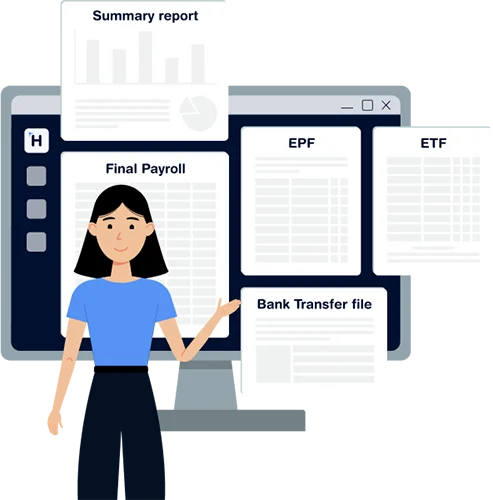Anybody would accept that human beings are dynamic creatures. But unfortunately, we are still light years behind artificial intelligence or robots replacing all the work human beings are capable of performing. I, myself, am a believer in keeping things as human as possible. Yet if you are earnest about growing our business and scaling up, automation of business processes will be a decision you will have to take sooner than later.
Payroll and HR management are commonly regarded as extremely sensitive processes where transparency, accuracy and efficiency are of paramount importance. Therefore, a sizable portion of these processes is still handled or overseen by qualified individuals. However, accountants or HR professionals, no matter how skilled, are still human beings who can be prone to commit human errors or even adopt substandard or unethical behaviour during operations. This is where audit trails come in.
What are audit trails?
An audit trail is a sequence of recorded computer events that involves any activity around the operating system, applications or user actions. One computer can have several audit trails that each serve a different purpose.
Audit trails have been around ever since humans started adopting standard methods of operation. Earlier forms of audit trails were often paper-based. If you have ever had the fortune to use a traditional library, you would have noticed that the librarian will log the books that you are planning to borrow in a logbook while also marking on the piece of paper on the last page of the book. This paper will offer a trail of who borrowed the book at which time and whether it was undamaged each time someone returned it.
For Sri Lankans, a more contemporary example is the traditional paper-based banking method. You would have noticed that a lot of signatures are needed at every stage of the process of depositing and withdrawing money. When you fill the deposit slip, you will sign at the bottom, and your teller will sign upon accepting the slip with the money.
Nowadays, many software developed for industries including financial and accounting, HR, manufacturing, Inventory, health and medical, clinical research, and e-commerce accommodates audit trails. Similarly, having audit trails in payroll and HR software has become a norm due to its many benefits.
1. Identify and Reduce Errors
Payroll processing requires the participation of several stakeholders. With the involvement of many stakeholders like the payroll officer, line managers, team leaders, finance team and HR team, there can be more opportunities for human errors. Employers must ensure that employees are accurately and fairly compensated for their work. And it is known that when errors frequently occur with their salaries, employees progressively lose trust in their employer. This can also harm the employer due to the legal implications of labour laws and regulations. Additionally, rectifying errors will be more complex and more costly when errors go unnoticed for a long time.
With the availability of an Audit trail, you can backtrack to the origin of the error quickly. In addition, the audit trail will state who did what and when. Some audit trails can be developed to capture more types of data to support the process of identifying and rectifying errors. Eventually, with the knowledge that an Audit trail will capture your every activity, it will also encourage the habit of operating as accurately and vigilantly as possible.
2. Detect and mitigate fraud
Payroll includes many confidential information like names, addresses, phone numbers, dates of birth, pay rates, benefits, deductions, and bank accounts. The payroll officer or the accountant is responsible for processing the payrolls legitimately and accurately. While revealing employees’ personal information can threaten their safety and privacy, information like employees’ pay packages can be used by rival/ competing companies to poach them.
Since payroll processing is often entrusted with an organization’s most trustworthy accountant or employee, more serious frauds like stealing money off employee salaries might occur rarely. Yet it does not eliminate the possibility.
Due to these reasons having an audit trail as a safety net to fall on in fraud detection and mitigation is a tremendous advantage for payroll software. Like with errors, the possibility of getting caught in the audit trail can help mitigate the risk of fraudulent activity. (act as a deterrent and make perpetrating a fraud more difficult to conceal). Audit trails also reduce the risk of misuse of payroll details, employee details and the power over the payroll process.
3. Audits
A business establishment in Sri Lanka must face several types of audits. Most prominent are statutory audits and internal audits. According to the audit manuals published by The Institute of Chartered Accountants of Sri Lanka, payroll is identified as a business process of substantial risk. Other than these audits, loan providers and investors might also require audits before committing to an agreement. In addition, there can be instances where Employee trade unions might request to review payroll records when disputes arise. Audit trails can help establish the sequence of events, determine the responsible individuals, study what leads to the error or fraud, impose necessary penalties, and deter such events in the future. It could also serve as evidence to implicate or exonerate individuals or establishments.
4. Employee dispute resolution
Employees of Sri Lankan businesses are protected by many legal frameworks locally and through international organizations such as the United Nations. However, injustice, unfair treatment, unfair compensation, and irresponsible behaviour on the part of the employer are taken seriously by the Sri Lankan legal system. Therefore, it is essential to treat matters of employee disputes relating to payroll with utmost care.
Employee disputes are dreaded nightmares for any HR professional. However, in case of a dispute, responsible parties in an organization can review audit trials to determine if an error has occurred, if so, when, how, by whom and what events led to the error. This can help either defend or implicate the responsible party. If not, the dispute can be reconciled peacefully and diplomatically, exonerating the alleged parties.
Audit trails will provide ease of mind for both the employer and the employee, knowing that real-time logs of the payroll process will be created, which will be an impartial witness during disputes.
5. Better processes and work ethics
Audits are about capturing errors and fraud, but they are also about mitigating risks of errors and fraud through enhanced internal controls. Therefore, Sri Lankan auditing practices heavily focus on strengthening internal controls. Better internal controls promote better work ethics and better work practices. Over time organizations can observe and establish good case practices, which will be transferred through succession.
When employees are aware of their activities on a software platform being recorded in an audit trail, it creates a sense of accountability. However, audit trails mustn’t forsake the level of autonomous decision-making awarded to each employee as a part of their job description, or they should not be discouraged from doing so.
Resources
https://tipalti.com/what-is-an-audit-trail/



